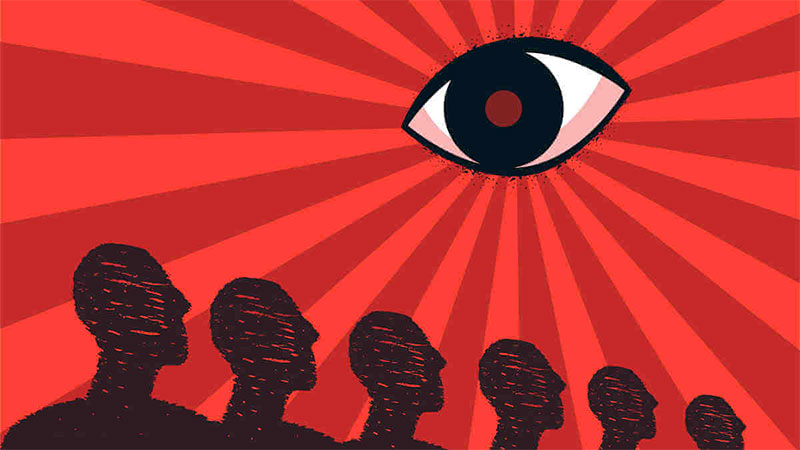
We have witnessed the destruction of medical ethics during the COVID era, which I have named “soft-core totalitarianism.”
I believe it aptly describes the sociopolitical — or is it sociopathological? — condition in which we find ourselves in the post-COVID world, both in the United States and throughout the other Western so-called liberal democracies. It certainly seems to describe the direction in which our collective culture is heading.
Let’s define soft-core totalitarianism as a political system, characterized by two features:
- First, there is centralized, autocratic control of the state by the executive branch of the government and its cronies (the totalitarianism part).
- Second, by design, the offenses to civil liberties are applied subtly and gradually enough, the standard of living is kept high enough, and a sufficient menu of seductive distractions are intentionally provided, that most individuals either don’t object, or don’t even notice (the soft-core part).
Soft-core totalitarianism can be readily contrasted with its hard-core counterpart, recent examples of which would be the killing fields of Khmer Rouge-era Cambodia, or the enforced starvation conditions of contemporary North Korea.
As with soft-core pornography, this comparison favorably disposes soft-core totalitarianism to the more pliant and undiscerning among us, who might say, “Well, yes, I suppose it isn’t ideal, but at least it’s not that horrible hard-core stuff!”
Also like soft-core pornography, soft-core totalitarianism is designed to possess a titillating and seductive quality that opposes one’s better moral judgment. To the weak-willed and soft-headed, the statement “You’ll own nothing and be happy” holds a similar appeal to “All the classiest girls, ready to talk about your deepest fantasies, just a phone call away.”
Soft-core totalitarianism was predicted by past seers who tried to warn us about where Western Civilization was headed. The leavening of tyranny with the intentional supply of banal distractions, creature comforts, and legalized drugs pepper their descriptions. They repeatedly describe a kind of semi-anesthetized, semi-tolerable dystopia:
“Films, football, beer, and above all, gambling filled up the horizon of their minds. To keep them in control was not difficult.” ~ George Orwell
“There will be, in the next generation or so, a pharmacological method of making people love their servitude, and producing dictatorship without tears, so to speak, producing a kind of painless concentration camp for entire societies, so that people will in fact have their liberties taken away from them, but will rather enjoy it, because they will be distracted from any desire to rebel.” ~ often attributed to Aldous Huxley
“Give them bread and circuses, and they will never revolt.” ~ Juvenal
Ring any bells? If not, consider the following, all of which occurred contemporaneously to the COVID-era lockdowns, school closures, travel restrictions, mask and vaccine mandates and other assorted assaults on our civil rights:
- Liquor stores were deemed essential from the beginning and remained open for business throughout the entire duration of the COVID lockdowns with the forced closures of many other businesses, such as gyms.
- No fewer than 17 U.S. States legalized recreational marijuana use since the COVID lockdowns began in March 2020.
- 33 U.S. states have opened legalized sports betting markets since the Supreme Court struck down the Professional and Amateur Sports Protection Act in May 2018.
- Over $220 billion has been wagered in sportsbooks in the U.S. since 2018.
- The U.S. Border Patrol seized over 15,000 pounds of fentanyl at the Mexican border in 2022 — three times as much as in 2020.
- 110,000 Americans died of drug overdoses in 2022.
Still skeptical? Let me put it another way. I am no Orwell or Huxley (and certainly no Juvenal), but please indulge me, Dear Reader, as I offer you my own soft-core totalitarian dystopian narrative:
As it happened, it was the Ides of March. Clinton Barker’s wife shook him awake. It was five-thirty, half an hour before his alarm was set to go off. “Come downstairs,” she said, “you’ve got to hear what they’re saying on television.”
A talking head on the screen was spouting instructions, the likes of which Clinton had never heard before.
“Everyone is ordered to remain in their homes,” the talking head announced. “I repeat: remain in your homes. Schools are closed until further notice. Workplaces are closed, except for those deemed essential by the authorities.”
Clinton Barker’s three young children, also glued to the television screen, howled with delight. “No school!” They cheered in unison. “NO SCHOOL!”
Clinton’s wife shushed them to silence.
“Authorities are insisting: we all have to do our part,” the cypher in the suit continued. “If we all stay in our homes for just two weeks — two weeks to flatten the curve, two weeks to stop the spread of the virus — then all will be well. Do your part and stay in your homes. Stay home with your families, your children. Think of it as a vacation. Relax and spend time with the family. Kick back and check out what’s on Webflix. In fact, Stephanie has some wonderful recommendations. Stephanie?”
An attractive blonde woman with a pneumatic figure, sitting next to the cypher, chimed in.
“So many great shows to watch on Webflix these days, Bill,” the blonde chirped. “There’s a fantastic new documentary on wild animal breeders called The Liger King. You have to see it to believe it. There’s also a thrilling new family adventure series, about a group of treasure-hunting teens, called Barrier Reefs. The whole family will love it. Plus there’s so many great series out there…no one could possibly be caught up on all of them: Tournament of Kings. The Contraltos. Turning Evil. As for me, Bill, I’m going straight home after this and I’m just going to binge.”
Clinton Barker’s mind raced. What is happening? What if they lock us down longer than they claim? How will we feed the children? How will we pay the rent? How will we…
As weeks passed, Clinton’s first fear was indeed realized — the lockdowns persisted, much longer than initially claimed. But all around him, no one seemed to mind very much. The authorities made sure of that. The televisions ran nonstop, and just like the pneumatic blonde, everyone Clinton spoke to on the phone seemed to be binging on streaming entertainment. The grocery stores remained open, and of course, so did the liquor stores.
Before long, the state announced that marijuana had been legalized. Soon thereafter, Clinton received a check from the government, sufficient to cover a few months’ groceries. Even the rent was not a problem. The state announced a moratorium on all rent collection until further notice.
Sound familiar?
For those of you still skeptical of my thesis, save your time and read no further. I wish you good luck; I suspect you will need it. To paraphrase Sam Adams, may your chains set lightly upon you, and may posterity forget that you were my countrymen.
For those of you who agree that we are indeed living in an age of soft-core totalitarianism (and which, I fear, is the inevitable gateway to the hard-core variety), here are potential remedies.
- We must fight tooth and nail against every incursion on civil rights and liberties, regardless of how it affects our creature comforts or our standard of living.
- We must insist that every government action be legal passed by law through the elected legislature and challenged in court if unconstitutional.
- We must fight against executive orders and declarations of emergency called at the drop of a hat. These extralegal abuses must be stopped.
- We must hold accountable those individuals, especially those who are unelected, who are guilty of crimes against liberty, civil rights, and humanity. If individuals are not appropriately punished, systems will continue to decay.
May God have mercy on us all.
-------------------------------------
C.J. Baker, M.D., an internal medicine physician with 25 years in clinical practice. His work has appeared in the Journal of the American Medical Association and the New England Journal of Medicine. From 2012 to 2018, he was Clinical Associate Professor of Medical Humanities and Bioethics at the University of Rochester.
















